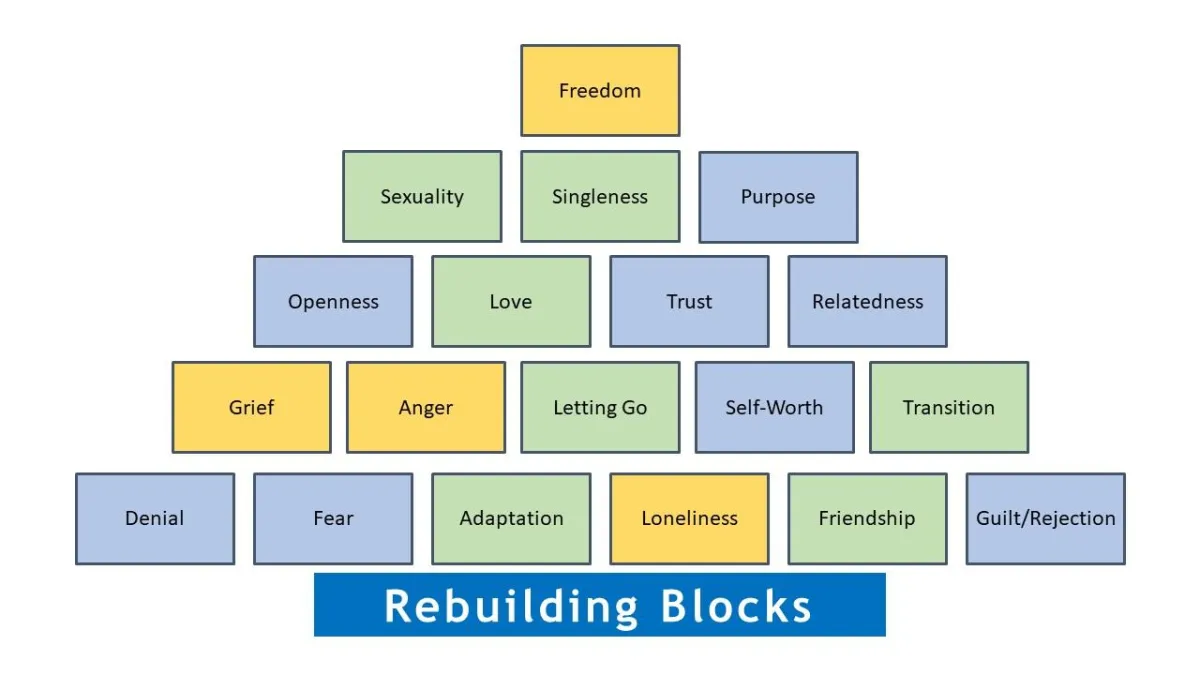The Proven Process
The 4 Stages
The Rebuilding Programs has changed more than 100,000 lives. Now, it's your turn.
The Fisher Rebuilding Seminar was first created in the 1980s by Dr. Bruce Fisher. As he worked privately with people he realized that modern therapeutic methods weren't sufficient. So he began studying the issues to understand what people needed and what information and strategies actually worked.
He eventually simplified the issues in 19 steps for people to work through. Then, he organized them into a logical flow that anyone can follow.
The 19 "Blocks"
Everyone's circumstances of their divorce is unique, but the effects are similar. Dr. Bruce Fisher created a step-by-step structure that walks people through each step or "block". He called this "climbing the mountain". At the top, is freedom. For one person a particular block may take 5 minutes. For another it is "the" block that they are stuck on. By giving you a map and the right guidance from an expert, you are able to rebuild your life, very quickly.

The 4 Phases
The 19 steps can be daunting to people that are overwhelmed. Rest assured that it isn't as hard as it looks. In fact the process can be simplified into 4 major phases.
01
Thinking
Our thoughts can create our suffering. Having the right mindset and learning how to shift your thoughts so that you are the victor, not the victim is life changing. When you are in control you are strong and resilient.
02
Feelings
Anger, grief, loneliness, shock, anxiety and more are feelings. Yet most people don't really know WHAT they are feeling, nor what to do with them. When you allow yourself to turn toward your feelings you are more alive and engaged. What you feel is real!
03
Identity
Many people "lose themselves" in their relationships. Then, when the relationship ends they simply don't know who they are. By reconnecting with yourself, maybe for the first time, you become centered and solid. You are authentically you.
04
Relationships
The first 3 phases set the foundation for this phase. They are directed inside. The last phase is about your connections with others. You will learn how to build healthy, meaningful and deeply satisfying relationships.
WITH THE 10-WEEK GROUP PROGRAM YOU WILL RECEIVE:
20-25 Hours of Live, In-class Learning
Class Materials: Including a textbook and workbook (over 200 pages of printed information)
Access to a video library so that you can learn and grow on your own schedule as well.
Weekly calls with your peers to give and get support from others also committed to recovery.
2 30-Minute private calls with your facilitator (one at the beginning and one at the end)
Create Your Divorce Recovery Plan
Step 1: Take our free divorce adjustment self-test (button below).
Step 2: You will get an "emotional weather report" by email on how you are doing in 6 key areas of divorce adjustment.
Step 3: Stay tuned for further information by email on what your scores mean and what you can do to start feeling better fast.
Step 4: Sign up for a free consultation to review your scores (button below).
Step 5: Sign up for a Fisher Rebuilding Seminar(TM) on the Classes tab.
Step 6: Sign up for the divorce support group for support until the next seminar starts on
February 5, 2025 at 6:30 pm. Call (925) 787-8865 to sign up.
Stay up to date
Ready to continue Rebuilding? Stay up to date on the latest news, articles, and blogs.

Healing Through Divorce
Healing Through Divorce: Navigating the Emotional Rollercoaster with Resilience
Divorce can be an emotional rollercoaster, with moments of shock, denial, anger, and sadness, to name just a few of the emotions one might experience. It's a tough journey, but you're not alone. Understanding the emotional stages of divorce and learning effective coping strategies can make this tumultuous ride smoother.
The Initial Shock and Denial: Riding the Emotional Rollercoaster
When divorce hits, it's like being struck by lightning. Shock and denial wash over you, making it hard to accept the end of your marriage. These feelings are entirely natural, and it's crucial to acknowledge them. Allow yourself to experience the disbelief, the anger, and the confusion. Journaling your thoughts can be a helpful technique, providing an outlet for your emotions.
Grieving the Loss: Embracing the Healing Process
Grieving is an integral part of divorce, similar to mourning the death of a loved one. You need to grieve not just the end of your marriage but also the dreams and plans you had for the future, including the likely loss of full-time access to your children. It's normal to feel anger and sadness; these emotions are stepping stones toward healing. Seeking therapy, joining a support group, or participating in a divorce recovery group can provide a nurturing environment to express your feelings and initiate the healing process.
Navigating Anger and Resentment: Channeling Emotions Positively
Anger and resentment are natural responses to divorce, particularly in cases of betrayal or unresolved issues. Acknowledging these emotions and learning to channel them constructively are crucial. Engaging in physical activities like jogging or yoga can help release pent-up anger.
Finding Forgiveness
Forgiving your ex-spouse is one of the most challenging tasks you'll face. It takes time, but once you release the anger, you'll feel lighter. Forgiveness liberates you from emotional baggage, allowing you to concentrate on rebuilding your life. If you're not ready to forgive, try wishing peace between you and your ex (or soon-to-be ex).
Finding Acceptance and Rebuilding Self-Esteem: Recognizing Your Worth
Acceptance is a pivotal moment in the emotional journey of divorce. It entails embracing the reality of your situation and understanding that your worth is not defined by your relationship status. Focus on self-compassion and self-care. Set boundaries, engage in positive self-talk, and indulge in activities that boost your self-esteem. Commit to a daily practice of esteeming yourself using positive affirmations.
Coping with Loneliness and Building a Support System: You're Not Alone
Divorce often brings profound loneliness. Building a robust support system is essential. Reach out to friends and family. Reconnect with old friends or engage in new hobbies and social activities. Remember, there are people who care about you and want to see you thrive. If you're still struggling, consider joining a support group or a divorce recovery group. Learn about the differences between the two in our companion article and stay informed about available support.
Embracing Support
Many individuals who have joined a divorce support group or attended a divorce recovery seminar describe it as a turning point. Sharing their experiences with others who understand what they're going through made them realize they weren't alone. The camaraderie and understanding are incredibly comforting.
In conclusion, understanding the emotional journey of divorce is crucial for healing and moving forward. Embrace your emotions, seek support, and prioritize self-care. Remember, it's okay to feel, and it's okay to seek help. With time, patience, and the right support, you can emerge from this challenging experience stronger, wiser, and ready to embrace the next chapter of your life.
Contact Us
You’ve already come a long way. Let’s reach the next level together.

Email: jerryfmellin@gmail.com
Address:
St. John Vianney Catholic Church, 1650 Ygnacio Rd
Walnut Creek, CA 94598
Copyright © 2025 CCC Rebuilders. All rights reserved.
